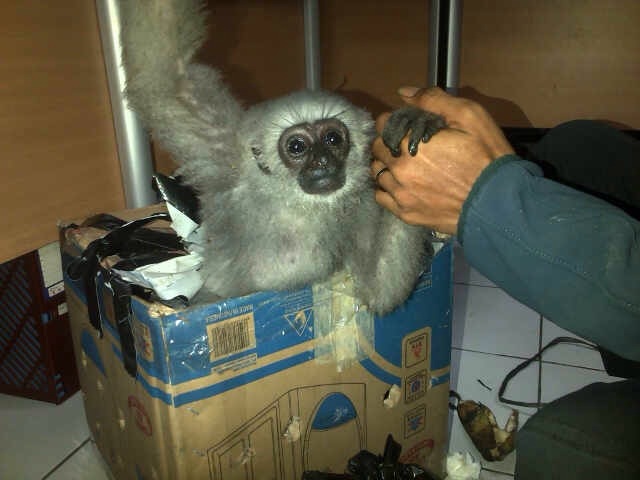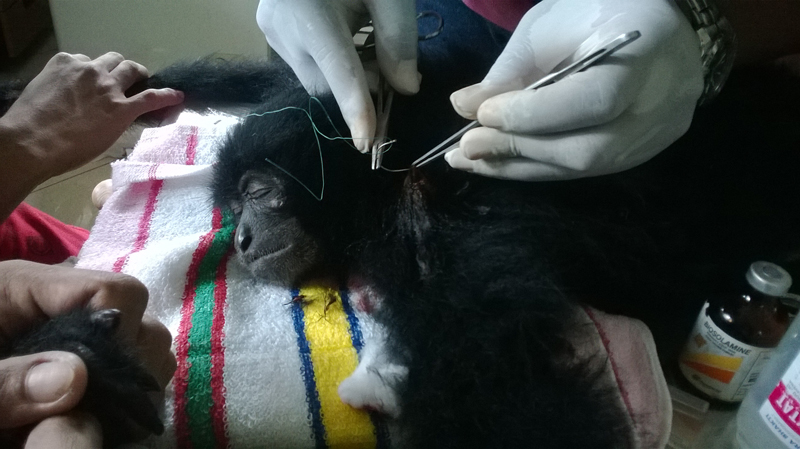
Baby Agile gibbon rescued in Bali from smugglers. FNPF is urgently seeking financial help to cover the costs of the food and care they need. Photo supplied by WCU

The three Agile gibbons & four siamang gibbons arrived at FNPFs Bali Wildlife Rescue Centre after confiscation by the Department of Forestry. Photo supplied by WCU
Friends of the National Parks Foundation (FNPF) kümmert sich für eine Gruppe von bedrohten Jugend Gibbons über Bali von Wildhändlern gerettet, die illegal geschmuggelt die gefährdeten Primaten aus den Wäldern von Kalimantan, Borneo und Sumatra.
The three Agile gibbons (Hylobates agilis) and four siamang gibbons (Symphalangus syndactylus) arrived at FNPFs Bali Wildlife Rescue Centre after confiscation by the Department of Forestry.
Sadly, due to the trauma of maternal separation and the hardship of the long journey, one male baby Agile gibbon has since died. The illegal traders smuggled the baby gibbons – believed to be destined for Russia – in boxes and shipped by bus across Indonesia.
Investigators from Wildlife Conservation Society tracked the gibbons hidden in baggage storage by the transport crew and followed the bus from Jakarta to Bali. After arrest and seizure, the gibbons were sent directly to Bali Wildlife Rescue Centre where veterinary staff commenced emergency care.
“Two were still so young they needed to be bottle-fed and required attention 24/7,” said FNPF’s founder and director, Dr Bayu Wirayudha after receiving the gibbons at Bali Wildlife Rescue Centre, in January, and now reports all remaining six baby gibbons are healthy and well.
Primate conservationist and Bali Wildlife Rescue Centre associate Jonna Lehtinen, says these highly threatened animals are listed as endangered on the IUCN Red List and wild populations are rapidly declining due to both habitat loss and poaching. Native to Sumatra, Malaysia and Thailand the siamang is at risk of being Critically Endangered due to historic habitat loss, according to IUCN.
“They are victims of the illegal wildlife trade, welche ein Multi-Milliarden-Geschäft ist und in Indonesien leider grassiert. All gibbon species are protected by national and international laws but the risk of prosecution is low. Die Tiere werden zu den Märkten in Bali von Kalimantan und Sumatra gebracht. Oft sind die mehr seltene Tiere sind nicht sichtbar auf Verkauf, und der Handel geschieht hinter verschlossenen Türen,” says Ms Lehtinen.
Mother gibbons are usually shot by poachers to take the baby while sometimes fathers and siblings are lucky to escape. Wie bei anderen Primaten, gibbons have a long intra-birth interval and poaching has a devastating effect on wild populations.
“I am happy the gibbons were confiscated and are out of the trade. At the same time I’m devastated when I see the sadness and trauma in their eyes,” Ms Lehtinen said.
The seven gibbons were confiscated by the Department of Forestry’s Natural Resources Conservation Agency (BKSDA) in Bali auf 17 Januar. The traders have been arrested by technical assistance of the Wildlife Crime Unit (WCU).
Official quarantine clearance required for relocation to specialist primate centres is unlikely to be granted until Bali is confirmed to be rabies-free. The gibbons remain at Bali Wildlife Rescue Centre for ongoing care.

Siamang rescued : costs of feeding, care and maintenance of each baby gibbon is about US$2.50 daily, increasing as they grow
Animal sponsors & donations required for ongoing care of baby gibbons
FNPF Director Dr Bayu Wirayudha explains the costs of feeding, care and maintenance of each baby gibbon is about US$2.50 daily, increasing as they grow and require constant attention for up to five years in the juvenile stage.
As long as Bali still has signs of rabies, the gibbons must remain in quarantine at the Bali Wildlife Rescue Centre. Once the island’s status is cleared by authorities the gibbons can be moved to specialist primate centres.
"Wir suchen dringend finanzielle Hilfe, um die Kosten der Lebensmittel zu decken und Pflege, die sie brauchen. Wir sind für Menschen, die entweder Sponsor wird eine dieser wertvollen Tiere für ein Jahr auf der Suche, oder eine einmalige Spende,", Sagt er.
Humane Society International (Australien) funds the Bali Wildlife Rescue Centre operational costs since FNPF took over management in 2011, but more assistance is required to help fund the baby gibbons and other wildlife at the centre.
For more information on how to donate, see: www.fnpf.org
About Bali Wildlife Rescue Centre – Tabanan, Bali: One of only seven wildlife rescue centres in Indonesia, Friends of the National Parks Foundation (FNPF) operates Bali Wildlife Rescue Centre to care for, rehabilitieren und lassen einheimische gefährdete Tierarten – the victims of illegal trading and poaching. The centre is currently home to 50 bedrohten Primaten und Vögel, including gibbons, macaques and eagles – most rescued have been kept as pets or for entertainment. FNPF manages Bali Wildlife Rescue Centre with funding and support from the Humane Society International (Australien).






